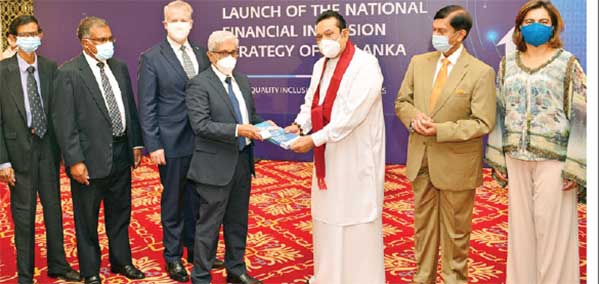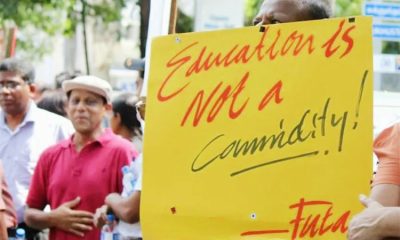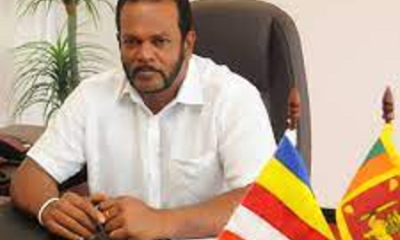Business
CBSL and IFC launch National Financial Inclusion Strategy

Sri Lanka’s first National Financial Inclusion Strategy (NFIS) aunched recently, aims to make financial services more accessible, efficient, and affordable for all households and businesses in the country.
The NFIS is a joint effort led by the Central Bank of Sri Lanka—with technical and financial assistance from IFC, a member of the World Bank Group—under the IFC-DFAT Women in Work program. The development of this strategy was a multi-stakeholder effort supported by the government of Sri Lanka.
“The National Financial Inclusion Strategy symbolizes our country’s commitment towards a better and inclusive Sri Lanka that will benefit all individuals and enterprises. I believe this strategy will complement the Government’s efforts to minimize the provincial income disparities, urban-rural inequalities, and to promote inclusive growth,” said Mahinda Rajapaksa, Prime Minister of Sri Lanka.
“More importantly, this strategy prioritizes future generations, having identified financial literacy as a key pillar. The proposal to strengthen the national curriculum in this area is a positive step. Investing in the education of our younger generation is the most significant investment we can make as a nation, as this will be a particularly helpful approach to the systematic correction of the financial habits of Sri Lankans,” the Prime Minister said.
Business
Dialog, Axiata Group and Bharti Airtel sign Definitive Agreement to merge operations in Sri Lanka

Dialog Axiata PLC (“Dialog”), Axiata Group Berhad (“Axiata”) and Bharti Airtel Limited (“Bharti Airtel”) (collectively “the Parties”), signed a Definitive Agreement to combine their operations in Sri Lanka. Under this agreement, Dialog will acquire 100% of the issued shares in Airtel Lanka, in consideration of which Dialog will issue to Bharti Airtel, ordinary voting shares which will amount to 10.355% of the total issued shares of Dialog by way of a share swap. The transaction is subject to the approval of Dialog’s shareholders and is pending the completion of specific conditions outlined in the Share Sale Agreement, including clearance from the Colombo Stock Exchange (CSE) and completion of other applicable legal, corporate and regulatory compliance procedures.
The Telecommunications Regulatory Commission of Sri Lanka (TRCSL) has granted its approval for the proposed merger, underscoring its vision to advance the adoption of telecommunications services across Sri Lanka.
This consolidation will enable the merged entity to garner economies of scale and reduce duplication of infrastructure, achieve synergies in technology and capital expenditure leading to enhanced high speed broadband connectivity, voice and value added services, cost savings and operational efficiencies.
Vivek Sood, Group CEO and Managing Director of Axiata Group Berhad said, “The merger between Dialog and Airtel Lanka is aligned to Axiata’s strategy of market consolidation and resilience. The merger will create value for the shareholders of Dialog Axiata PLC and Axiata Group through achievable synergies. We have the utmost respect for Airtel Lanka and its employees and look forward to working together as we integrate the two companies.”
Commenting, Dr Hans Wijayasuriya, CEO Telecommunications Business and Group Executive Director of Axiata, added “This merger brings together the strengths of two leading telco groups and bodes well for the Growth and Sustainability of Sri Lanka’s flagship Telecom Sector. We look forward to the new frontiers in Customer Experience and innovation the company will deliver to Sri Lankan Consumers and Enterprises.”
Gopal Vittal, MD & CEO Bharti Airtel Limited Said, “We are happy to merge our Sri Lanka operations with Dialog. Given the scale and unique propositions they offer, we are certain that our customers will continue to enjoy cutting edge services on a seamless network.”
“It is a privilege to welcome the team at Airtel Lanka to the Dialog family and together we take a significant step forward in our commitment to delivering superior telecommunications services in Sri Lanka”, remarked Supun Weerasinghe, Director/Group Chief Executive of Dialog Axiata PLC.
“The integration of Dialog and Airtel Lanka operations will unlock new opportunities for innovation and growth, and this will lead to benefit consumers.” Ashish Chandra, Chief Executive Officer, Bharti Airtel Lanka (Private) Limited.
Business
Israel-Iran tensions: Saudi Arabia reckoned as best mediator

By Sanath Nanayakkare
Saudi Arabia has the capability to play a key role in mitigating tensions between Israel and Iran and prevent the conflict from causing broader consequences to the geopolitical order, global oil market and global financial markets, Samer Talhouk, Senior Analyst, Risk & Industry Research MENA (Middle East and North Africa) Fitch Solutions, said during a webinar.
Fitch Solutions BMI webinars present expert analyses of the political and economic risks that could impact growth strategies in more than 200 markets.
Setting the tone for the webinar BMI said,” Israel and Iran have been on a collision course throughout Israel’s six-month war against Hamas militants in the Gaza Strip. Iran’s dramatic aerial attack on Israel follows years of enmity between the countries and marks the first time Iran has launched a direct military assault on Israel. Meanwhile, President Joe Biden warned Prime Minister Benjamin Netanyahu that the U.S. would not take part in a counter-offensive against Iran.”
“In above context, Saudi Arabia has the capability to mediate between Israel and Iran as the two countries have restored their ties, and have a good working relationship. There is an opportunity for Saudi Arabia to seize, in this evolving scenario, and help ease the tensions in the region,” he said.
Ramona Moubarak, Head of MENA Country Risk and Global Banking- Fitch Solutions said if tensions prevail in the region for months and Iranian oil is removed from the global market due to sanctions or blockades, the price of crude oil could spike to USD 120-!50 per barrel .
“And then oil price hike will lead to inflationary pressures across the borders. In addition to that, vulnerabilities stemming from the conflict to the maritime security could have adverse effects on shipping in trade routes,” she said.They discussed different scenarios between escalation and de-escalation of tensions in the region for international businesses to consider in their decision making.
Business
Tourism industry, an effective solution to SL’s economic crisis – Dr. Malraj Kiriella

By Ifham Nizam
Sri Lanka is in the grip of an economic crisis with an uncertain future looming, but the tourism industry represents one effective solution to the economic downturn, tourism expert Dr. Malraj Kiriella said.
Speaking at a public forum recently on the tourism sector in Sri Lanka, Kiriella said that tourism not only generates much-needed foreign exchange but also brings about revenue that filters down to the periphery.
The forum, a 20th round table discussion, was organized by the Gamani Corea Foundation and was held at the BMICH. The discussion centered on an issues paper on the ‘Tourism Sector’ which was authored and presented by Kiriella.
Kiriella is a multi-disciplinary expert, having over 30 years of professional work experience in the travel and tourism industry. He has worked in different capacities at senior management level in national tourism administration, research and planning, marketing and promotions, compliance and standardization, international relations and sustainable development. He is the Founder/Owner of South Asia Multidisciplinary Advisory Services (SAMAS).
Kiriella also said that the government is putting in numerous efforts to get the tourism industry off to a great start.
Kiriella added: “Tourism will be core to Sri Lanka’s future growth. The economic potential of the industry is gigantic. Without a doubt, it requires a focused and holistic approach and realistic goals in order to reach its full potential.
‘The lack of a Tourism Satellite Accounting System and documentation on direct GDP and employment from tourism underscores the urgent need for improved methods to estimate tourism’s economic impact. Sustainable practices remain largely confined to major operators, with SMEs facing barriers like funding and technology.
“The scarcity of case studies on sustainable hospitality practices hampers our understanding of effective strategies and their impacts.
“To foster change and competitiveness, collaborative efforts are vital to compile and share these case studies, encouraging broader adoption of sustainability in our industry. One critical issue is the prevalence of unregistered tourism establishments which is estimated to be more than figures relating to registered establishment rooms. This lack of formal registration hampers ability to make informed policy decisions, ensure quality control, and effectively collect taxes. We need a survey to identify barriers to registration and improve data accuracy. By understanding these obstacles, we can implement targeted measures to support both registered and unregistered establishments, fostering a more inclusive and sustainable tourism industry.
“Additionally, the lack of analysis in tourism value chain development hampers planning and management. Comprehensive research is urgently needed to understand market potential and multiplier effects, facilitating the establishment of robust frameworks for sustainable tourism growth.
“Sri Lanka’s tourism sector faces skill shortages and low women’s participation, hindering its growth. Women’s involvement is below 10%, far below global of 54% and Asia-Pacific average of 53%. Cultural barriers impede their participation, requiring intervention. Preserving resources and adapting to consumer preferences is essential. Addressing negative publicity is vital for sustainable growth and international market access.”
Speaking to The Island Financial Review, Devindre Senaratne, past president of the Sri Lanka Association of Inbound Tour Operators and chairman, Sigiriya Jungles Resort said tourism is one of the most important industries and rightly the low-hanging fruit for Sri Lanka’s economy. It is very important to make strategic decisions from all stakeholders to ensure that tourists visiting Sri Lanka from any part of the world have a pleasant stay while they are here.
Senaratne, who was one of the panelists at the forum added: “Tourism brings in a considerable amount of foreign exchange and in 2018 our best year, we had 2.3 million tourists and had a forex income of USD 4.5 billion which was the second best net foreign exchange contributor. We are very confident with the present demand patterns, we will handle approximately 2 million tourists and have an income of over USD 4.5 billion for 2024.
“Our infrastructure facilities to serve the tourists are very important for them to conveniently get about without any hassle. For example, we need to get ourselves better organized with facilities at the airport to quickly disembark without a hassle at immigration.
“Line ministries, such as, Sri Lanka Railways, Department of Wildlife and the Central Cultural Fund need to have online ticket purchasing systems to enable convenient purchasing of tickets.
“Tourist Police could be a major supporter too if they will be on the alert at major tourist sites and the popular beaches to ensure the tourists are safe. They could also advertise an emergency number.”
-

 News6 days ago
News6 days agoSinhala and Tamil New Year auspicious times
-

 Business3 days ago
Business3 days agoSOEs seen as failing SL’s ordinary citizens
-

 News4 days ago
News4 days agoSay no to NEPF! Say no to abolishing free education!
-

 News6 days ago
News6 days ago123rd Birth anniversary of Dr S A Wickramasinghe commemorated
-

 Business19 hours ago
Business19 hours agoSLFEA appoints JAT as a Facilitation Partner for training painters to provide overseas employment opportunities
-

 Midweek Review3 days ago
Midweek Review3 days agoBetween abstraction and empathy in Sarath Chandrajeewa’s visual paraphrases
-

 Latest News3 days ago
Latest News3 days agoFormer Member of Parliament Palitha Thewarapperuma passes away
-

 Business19 hours ago
Business19 hours agoCEAT Kelani launches 3 new radial tyre variants in ‘Orion Brawo’ range



























